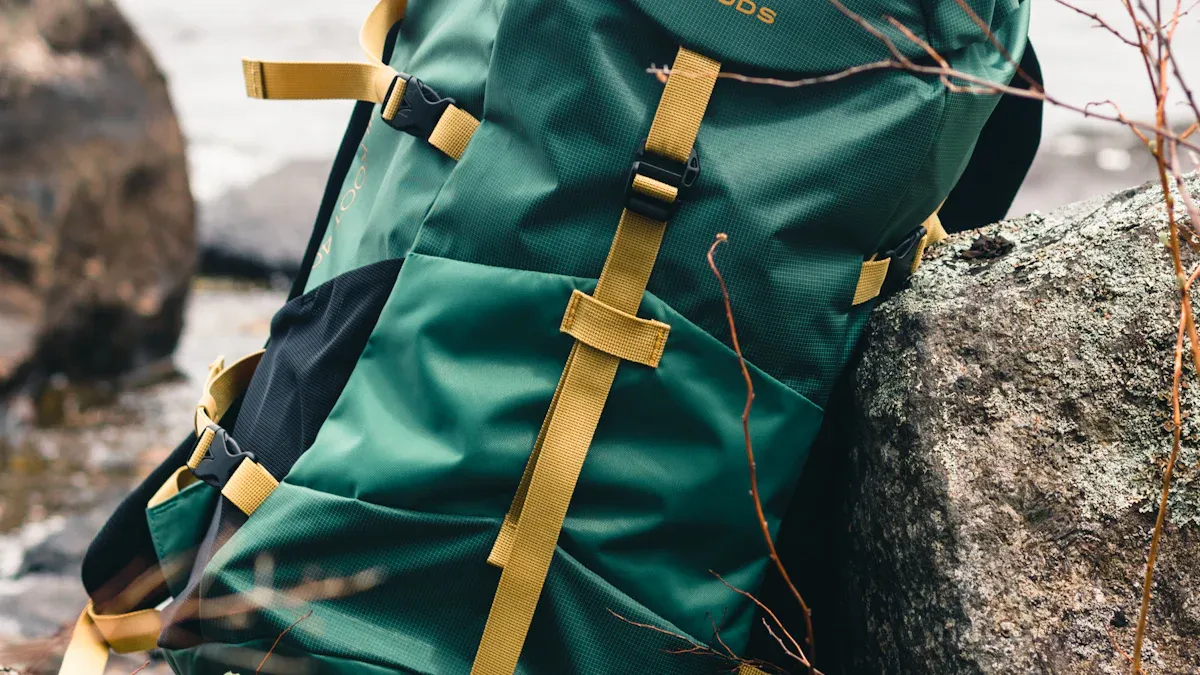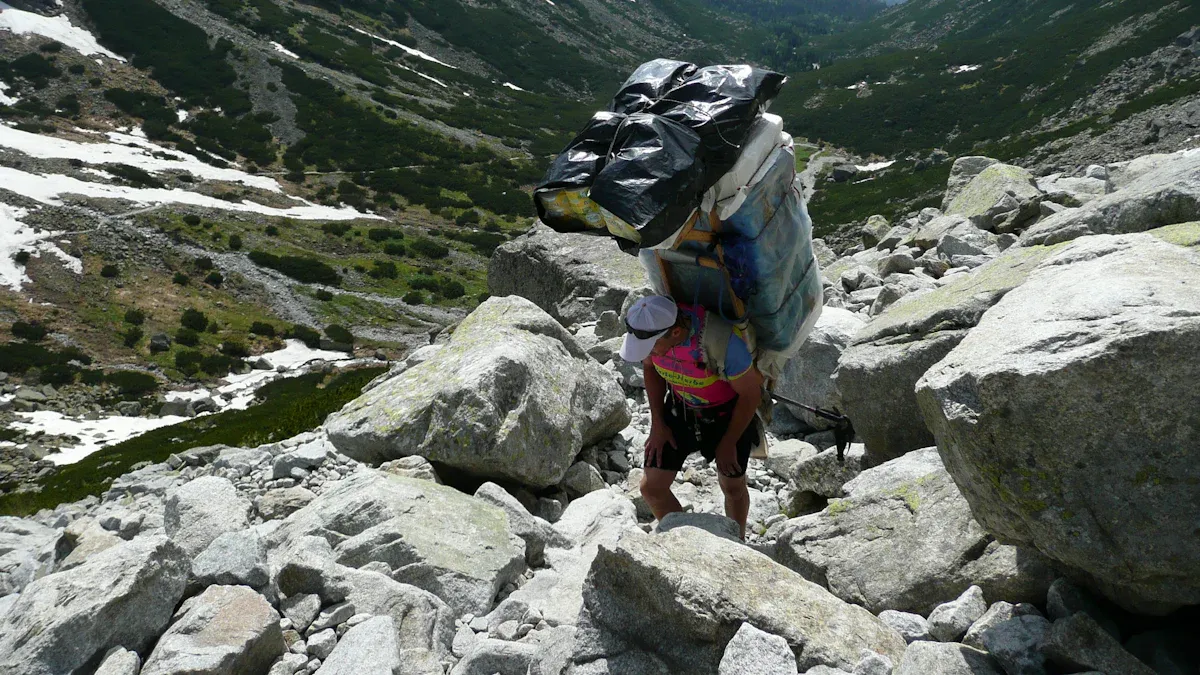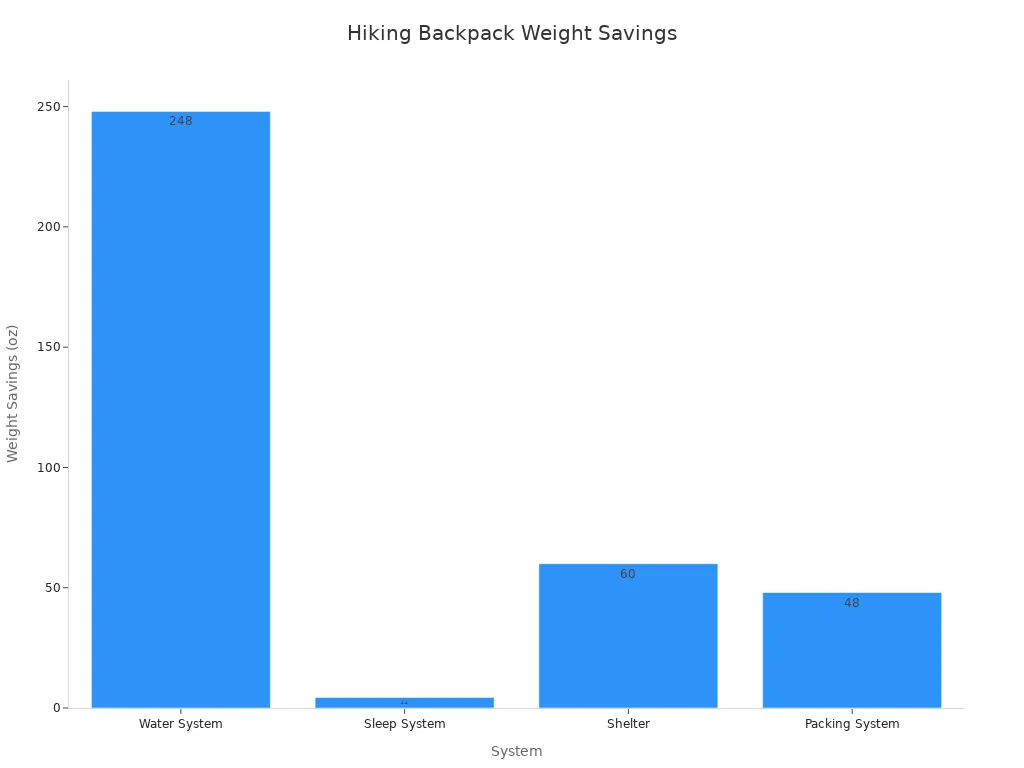
When you’re gearing up for an adventure, the weight your large backpack can hold is a crucial factor. A 60-liter backpack can typically carry between 30 and 50 pounds of gear.
But don’t just stuff it to the brim! Think about your trip type and how long you’ll be out.
Your personal fitness matters too. A well-designed pack, like the ones from Bilibag, makes all the difference. They’re built to handle heavy loads while keeping you comfortable and safe on the trail.
Key Takeaways
- A 60-liter backpack can hold up to 50 pounds, but aim for 20-30% of your body weight for comfort.
- For day hikes, keep your pack under 10% of your body weight to avoid strain and injury.
- Choose lightweight gear to reduce your pack weight. Every ounce saved makes hiking easier.
- Pack heavy items close to your back for better balance and comfort while hiking.
- Always adjust your backpack straps for a snug fit to prevent discomfort during your adventure.
Maximum Weight Guidelines for a Large Backpack

Day Trips and Short Hikes
For day trips or short hikes, you’ll want to keep your load light and manageable. A small or medium pack is usually enough. If you have a large backpack for hiking, carry only the essentials. Think water, snacks, a first-aid kit, and maybe a lightweight jacket.
Studies suggest that carrying no more than 10% of your body weight is ideal for short outings. For example, if you weigh 150 pounds, your pack should stay under 15 pounds. This keeps you comfortable and reduces the risk of strain or injury.
Tip: Daypacks are made for lighter loads. If you use a larger pack, adjust it well to avoid discomfort.
Multi-Day Trips and Backpacking Adventures
When you’re heading out for a multi-day trip, your large backpack becomes your lifeline. It needs to carry everything from food and water to shelter and clothing. For these adventures, a pack weight of 20-30% of your body weight is generally recommended.
If you weigh 150 pounds, this means your pack should weigh between 30 and 45 pounds. However, lighter is always better. Swapping heavier gear for lightweight alternatives can make a huge difference.
Pro Tip: Focus on the “essential three” items—your tent, sleeping bag, and backpack. Upgrading to lighter versions of these can save you several pounds.
Camping and Extended Expeditions
For longer trips or camping expeditions, your large backpack will need to handle heavier loads. These trips often require extra food, water, and gear, especially if you’re venturing into remote areas. A well-packed 60-liter backpack can typically hold up to 50 pounds, but you should still aim to keep the weight manageable. Carrying more than 30-35% of your body weight can lead to fatigue and even injury.
Weather and terrain also play a role. If you’re hiking in cold weather, you’ll need bulkier clothing and possibly a heavier sleeping bag. On the other hand, summer trips might allow you to pack lighter. Always balance your load to match the demands of your trip.
Note: Distribute the weight evenly in your pack to maintain stability and prevent back pain. Heavy items should be placed close to your back, while lighter items can go toward the top or sides.
Factors Influencing the Ideal Weight for a Large Backpack
Trip Length and Duration
The length of your trip plays a significant role in how much weight you should carry. For shorter trips, you can pack light and stick to the basics. But for longer adventures, you’ll need more supplies like food, water, and clothing.
Carrying a heavy load for extended periods can take a toll on your body. Research shows that carrying a bag for more than 20 minutes each day can raise the risk of muscle and joint pain by up to 30 times. If you’re hiking for hours or days, this risk grows even more. To avoid fatigue, aim to keep your pack weight manageable and take regular breaks.
Tip: If you’re planning a multi-day trip, test your pack at home. Walk around with it to see how it feels before hitting the trail.
Weather and Seasonal Considerations
Weather can change everything about packing. In colder months, you’ll need bulkier items like insulated jackets, gloves, and a heavier sleeping bag. This adds weight to your large backpack.
On the flip side, summer trips often allow you to pack lighter gear. Rainy weather? Don’t forget a waterproof cover or poncho.
Always check the forecast before you pack. Adjust your gear to match the conditions so you’re prepared without overloading yourself.
Note: Layering is key for cold weather. Choose lightweight, moisture-wicking layers to stay warm without adding unnecessary bulk.
Physical Fitness and Experience Level
Your fitness level and hiking experience also affect how much weight you can comfortably carry. If you’re new to hiking, start with a lighter load and gradually build up as you gain strength and confidence.
Experienced hikers often know how to pack efficiently and manage heavier loads. However, even seasoned adventurers should avoid carrying more than 30-35% of their body weight. Overloading your pack can lead to back pain, poor posture, and even injuries.
Pro Tip: Strengthen your core and back muscles with exercises like planks and squats. A strong body makes carrying a large backpack much easier.
Tips for Reducing and Managing Backpack Weight
Focus on Must-Have Items
When packing your large backpack, pack only what you need. Lay out your gear and ask, “Is this necessary?” Stick to must-haves like food, water, shelter, and weather-appropriate clothing. Extra items should have a clear purpose to make the cut.
Here are some helpful tips:
- Easy Access: Keep snacks or a rain jacket in reachable pockets.
- Even Weight: Spread weight evenly to protect your back and shoulders.
- Save Space: Use packing cubes or compression sacks to keep things compact.
Tip: After each trip, check unused items. Leave them behind next time unless they’re for emergencies.
Choose Lightweight Gear
Switching to lighter gear can make hiking easier. New materials like Dyneema and LiteSkin help reduce weight without losing strength. For example, a lightweight tent or sleeping bag can save pounds.
Feature Details
Tested Product: Zpacks ArcBlast
Test Conditions: Great Divide Trail with 40 days of rain, snow, and sleet
Materials Used: Nylon, Dyneema (DCF), Ultra, LiteSkin
Weight: All recommended backpacks weigh under three pounds, showing advancements in technology.
You can also pack calorie-rich foods and bring a water filter instead of heavy water bottles. Every small change adds on the trail.
Pro Tip: Weigh your gear in ounces or grams. This helps you see where to cut weight and pack smarter.
Pack Smartly to Stay Comfortable
Packing your large backpack the right way makes it feel lighter. Put heavy items, like food or water, close to your back in the middle of the pack. This keeps the weight balanced and reduces shoulder strain.
Here’s how to pack better:
- Lay out gear first to decide what’s essential.
- Use compression sacks for bulky items like sleeping bags.
- Place lighter things, like clothes, at the top or sides.
- Tighten compression straps to keep everything stable.

Note: A balanced pack is easier to carry. Avoid putting heavy items far from your back, as this can throw off your balance.
By packing only essentials, using lighter gear, and organizing smartly, you’ll carry less weight and enjoy hiking more.
Matching Backpack Capacity to Weight for Different Trip Types
Picking the Right Size for Your Trip (e.g., 60 liter hiking backpack)
Choosing the right backpack size depends on your trip and gear. Smaller packs, under 50 liters, are great for day hikes or short trips in warm weather. For longer trips, a 60 liter hiking backpack works well. It can hold supplies for 2-4 nights without being too heavy.
If you’re going on a week-long trip or into cold weather, you’ll need a bigger pack. Look for one over 85 liters to fit bulky gear and extra food.
Tip: Think about how many days you’ll be hiking, the weather, and if you prefer packing light or bringing extra comforts.
Important Features of Large Backpacks
Not all large backpacks are the same. The best ones are comfortable, durable, and smartly designed. When picking a pack, look for these features:
- Storage: Enough space, good pockets, and easy gear organization.
- Comfort: Padded straps, breathable materials, and even weight distribution.
- Stability: Extra straps keep the pack steady and prevent bouncing.
- Fit: Adjustable straps help the pack fit your body perfectly.
- Chafing Protection: Soft straps reduce rubbing during long hikes.
- Value: Make sure the price matches the pack’s quality and durability.
A well-made backpack makes hiking easier. It helps you carry your gear comfortably and efficiently.
Bilibag Backpacks for Hiking and Camping
Bilibag has large backpacks designed for hiking and camping. Their 60 liter hiking backpacks are popular for multi-day trips.
These packs are lightweight, comfortable, and have lots of storage. Adjustable straps and padded hip belts make carrying easier. For longer trips, Bilibag’s bigger models offer more space without sacrificing comfort.
Whether you’re new to hiking or experienced, Bilibag has options for you. Their backpacks are strong enough for heavy loads and keep you comfortable on the trail. If you need a dependable pack, Bilibag is a great choice.
